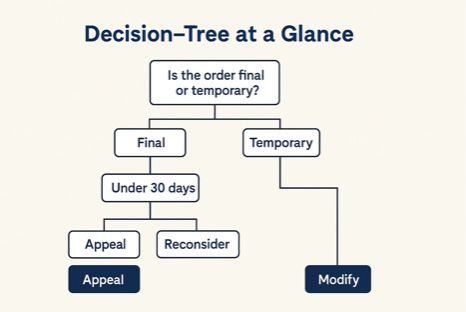You just got a court order that doesn’t feel fair. What now?
Whether it’s about parenting time, child support, spousal maintenance, or another life-changing issue, you may feel like the judge got it wrong or that your situation has changed since the order was issued. The good news? You’re not stuck.
You may be able to:
- Ask the judge to reconsider the decision
- Appeal to a higher court
- Request a formal change if your circumstances have shifted
This guide from Anderson Boback & Marshall explains your legal options in plain English so you can take the next step with confidence.
Step 1: Determine if Your Order is Final or Temporary
The first step is identifying what kind of court order you received. This changes what legal options are available to you.
| Type of Order | What It Means | Next Steps |
| Final Order | Resolves all or most legal issues in the case (e.g., divorce judgment, permanent parenting plan) | May be eligible for appeal or reconsideration (within 30 days) |
| Temporary Order | Interim ruling issued while a case is pending (e.g., temporary custody or support) | Usually not appealable unless there’s an urgent legal basis |
Not sure what type of order you have? We can help you decode it.
Step 2: Challenge the Order (Appeal, Reconsider, or Modify)
Understanding which path to take depends on two factors: how long ago the order was entered and what your goals are. Here’s how to break it down:
If it’s been less than 30 days since the court order:
You may be able to act quickly by:
- Filing a motion to reconsider: Ask the same judge to review the decision if you believe they made a legal or factual error.
- Filing an appeal: Request a higher court to review the ruling for legal mistakes. This is more formal and time-sensitive.
If it’s been more than 30 days:
You typically cannot appeal or ask for reconsideration, but you may still have options:
- File a motion to modify: If your circumstances have changed significantly (e.g., job loss, relocation, health issues), you can ask the court to update the order.
Unsure which option applies?
Get clarity with a legal review from our experienced team.
A visual summary of whether you should appeal, request reconsideration, or seek modification based on your order type and timing.
A quick look at your next legal move:
Option 1: Ask a Higher Court to Review It (Appeal)
Appeals involve taking your case to the appellate court to review the original judge’s decision.
Full guide: Filing an appeal in Illinois family law
Use this if:
- You believe the judge applied the law incorrectly
- The court ignored or misunderstood key facts
Legal basis: Appeals from final orders are governed by 735 ILCS 5/2-1202.
Timeline: You must file within 30 days of the final order. Filing a motion to reconsider pauses the deadline until that motion is decided. You must file within 30 days of the final order. Filing a motion to reconsider pauses the deadline until that motion is decided.
Possible outcomes:
- The appellate court affirms the decision (it stands)
- The court reverses it (overturned)
- The court remands it (sent back for new hearings)
Appellate review is narrow and based on transcripts, not new testimony.
Option 2: Ask the Same Judge to Reconsider
Legal basis: Motions to reconsider are governed by 735 ILCS 5/2-1203.
Use this if:
- New evidence becomes available after the hearing
- You believe the court misapplied the law
- There was a factual error in the decision
Deadline: Within 30 days of the order being entered.
This can be a faster and less expensive alternative to appeal, especially if it addresses a specific legal or factual issue.
If you believe the judge made a legal mistake or overlooked key evidence, you can file a motion to reconsider — but it must be done within 30 days of the order. This asks the same judge to review the case again, based on errors in law or fact. Learn more about reopening a divorce settlement in Illinois
Option 3: Modify the Order Based on Changed Circumstances
A motion to modify allows you to request a change to a prior order when life circumstances have significantly changed.
Legal basis: Modifications in Illinois family law are governed by 750 ILCS 5/510.
Explore how post-decree modifications work
Valid reasons to seek modification:
- Job loss or major income change
- New medical condition affecting you or your child
- A major relocation
- Changing school or childcare needs
Common types of modifications:
- Parenting time adjustments: Life changes — like a new job schedule, relocation, or a child’s changing needs — may require updating your parenting time agreement. Courts will consider modifications if they serve the best interests of the child.
- Spousal support updates: Alimony orders are not set in stone. If either spouse’s income changes significantly — through job loss, promotion, or retirement — support can sometimes be increased, reduced, or terminated.
- Child support recalculations: Illinois law allows child support orders to be recalculated if either parent’s income shifts, a child develops new educational or medical needs, or parenting time changes.
These motions require a showing of a substantial and ongoing change, not a temporary inconvenience. of a substantial and ongoing change, not a temporary inconvenience.
What to Bring to a Second-Opinion Strategy Session
Before consulting with a new attorney, have this ready:
- Final court order or judgment
- Court docket with hearing dates
- Copies of any motions you filed after judgment
- Hearing transcripts or notes
- Medical, financial, or job-related documentation
- Personal timeline of post-judgment events
Book your post-judgment review
Prefer to plan your budget first? Get the Illinois Attorney Fees Guide.
The Attorney Fees Guide will help you understand what affects legal fees in Illinois family cases, when a court can order fee contributions, and practical ways to control costs before you file.
Rare Legal Remedy: Relief from Judgment in Illinois
If it’s been more than 30 days since your judgment, and you don’t qualify for a typical appeal or modification, there may be one narrow option left. Under 735 ILCS 5/2-1401, you can ask the court to vacate a final judgment in rare cases of fraud, error, or newly discovered evidence. These petitions are technical and time-sensitive — usually limited to two years — and require legal precision.
Mistakes to Avoid That Can Derail Your Case
These common missteps can prevent you from successfully challenging or modifying a court order:
Missing your window: In Illinois, you typically have just 30 days to appeal or request reconsideration of a final judgment. If you wait too long, those options disappear, and you may be stuck with the outcome.
No legal basis: Strong emotions or disagreement with a ruling aren’t enough. You must show that the court made a mistake in applying the law, or that new, relevant facts have emerged that justify a change.
Trying to rehash old points: Courts won’t revisit issues just because you’re dissatisfied with how they were decided. Reconsideration and appeals require new legal arguments or facts—not a second attempt at the same case.
Handling it solo: Post-judgment motions involve strict deadlines, specific legal standards, and detailed formatting. Missteps can lead to your request being denied without ever being heard. Working with an attorney can prevent procedural errors that derail your case.
FAQs About Appeals and Post-Judgment Options in Illinois
What if I missed the 30-day appeal deadline?
If more than 30 days have passed since your final court order, you likely cannot appeal. However, you may still have legal options. If your life circumstances have changed significantly since the order was issued—such as a major shift in income, health, or parenting responsibilities—you might qualify to file a post-decree motion to modify the order instead.
Can I appeal a temporary custody or support order?
In most cases, no. Temporary orders are designed to manage a case while it’s still ongoing and generally cannot be appealed until a final judgment is entered. However, if a temporary order poses a serious risk to a child’s safety or well-being, an emergency motion or alternative legal action might be available.
What counts as a “substantial change in circumstances”?
A substantial change typically means something ongoing and significant that alters your ability to follow the original court order. Examples include job loss, serious illness, relocation for work, or major changes in a child’s educational or medical needs. One-time inconveniences or emotional disagreements typically don’t qualify.
Learn more about substantial change in circumstances
Can I change a judge’s property division?
Generally, no. Once a divorce is finalized, the court’s decisions about how to divide property and debt are permanent and not subject to appeal or modification. To challenge this, you would have needed to appeal the decision within 30 days or demonstrate a major procedural error or fraud during the original proceedings.
Next Steps to Get Control Over Your Post-Decree Appeal
- Review your court order type
- Confirm your timeline (30 days or later?)
- Know whether you’re appealing, reconsidering, or modifying
- Prepare supporting documentation
- Schedule a strategic review
















